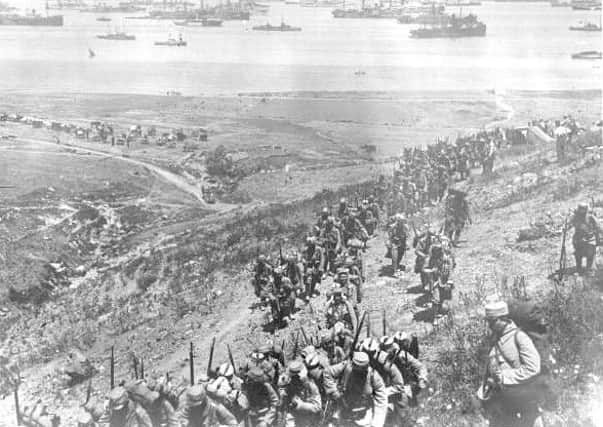Maiden City Great War Roll of Honour Part 16


Ruddy, Gunner William, 5731
William Ruddy, Royal Garrison Artillery, was born at Londonderry, enlisted at Belfast, and died on April 24, 1915.
His remains are interred in Carrickfergus (Victoria) Cemetery, County Antrim.
Smith, Private Walter John A., 498
Advertisement
Hide AdAdvertisement
Hide AdWalter Smith, 8th Battalion Canadian Infantry (90th Winnipeg Rifles) died on April 25, 1915.
Aged 29, he was the son of John W. T. and Jane Smith, Lawrence Hill, Londonderry.
His name is commemorated on the Ypres (Menin Gate) Memorial, Belgium. It is also recorded on St Augustine’s Church (Church of Ireland), Londonderry, First World War Memorial, and on the Diamond War Memorial.
The 8th Battalion (90th Winnipeg Rifles) CEF, was an infantry battalion of the Canadian Expeditionary Force during the Great War.
Advertisement
Hide AdAdvertisement
Hide AdIt was organised at Valcartier, Quebec, in September 1914. The battalion embarked on October 1, 1914, aboard ‘SS Franconia,’ disembarking in England on October 14.
It arrived in France on February 13, 1915, where it fought as part of the 2nd Infantry Brigade, 1st Canadian Division in France and Flanders.
On April 14, 1915, the battalion entered the Ypres salient. At 0400 hrs on the morning of April 24, a blue-green-yellowish cloud was seen coming towards the battalion trenches. It was the second enemy gas attack. Half the battalion succumbed to the poisonous fumes.
The battalion on the left retired and the 8th Battalion discovered itself in danger of being surrounded. But it held on. While supporting battalions were preparing new defences in the rear, the men of the Regiment kept up a fire on the enemy, drove off an attack on its front and withstood fire from left and right, and this from an enemy force five times its size.
Advertisement
Hide AdAdvertisement
Hide AdEarly the following day – the day Walter Smith lost his life – came relief troops from the Durham Light Infantry, but only for three companies of the battalion. Number 4 Company, on the right, under Captain George Northwood, saw its relief start forward and then turn back.
As the day wore on and the battle’s intensity did not relent, the Durham’s were seen gradually falling back. By 1800 hrs there were no troops left on the front fine except 4 Company and the machine gun section of the battalion.
Walter Smith went missing, and was later concluded dead. Three of his brothers served in the Great War. Albert J. Smith was gazetted second lieutenant, South Wales Borderers, around May 1918.
Robert Smith served with the 12th Inniskillings. And George F. Smith joined the 1st Battalion of the City of London Expeditionary Force, and was with the machine gun section around December 1914. Writing to a friend in Londonderry from the Front, around the same Christmas period, he said: ‘I am just dropping you a line, as I thought perhaps you would like to hear from me. No doubt you have heard I have been here for some time. So far I have got on all right, in spite of the very severe weather we’ve been having. We are being very well fed and looked after. Indeed, an army so well treated can spell nothing but victory. Our battalion has been in the trenches some time, and, considering the work done, our losses so far have been light. Personally, I have not yet been in the trenches, but am at present stationed a little to the rear of them with the gun section horses. I suppose we shall have our share in the conflict ere long, and Fountain Street won’t be in it when that comes. I am writing this in a barn, which is well “aired,” but, nevertheless, very comfortable. Wishing you a happy Christmas.’
Smyth, Private Samuel, 10696
Advertisement
Hide AdAdvertisement
Hide AdSamuel Smyth, 1st Battalion Royal Dublin Fusiliers, was killed in the Dardanelles, on April 25, 1915.
Aged 28, he was the son of James and Annie Smyth, 32, Emerson Street, Waterside, Londonderry.
His remains are interred in ‘V’ Beach Cemetery, Turkey, and his name is commemorated on the Glendermott Parish Church World War 1 Memorial, and on the Diamond War Memorial.
At the outbreak of the Great War, the 1st Battalion Royal Dublin Fusiliers were based at Madras in India. On November 19, 1914, they sailed from Bombay arriving at Plymouth on December 21.
Advertisement
Hide Ad